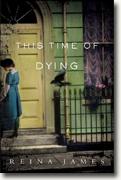This Time of Dying
Reina James
book reviews:
· general fiction
· chick lit/romance
· sci-fi/fantasy
· graphic novels
· nonfiction
· audio books
· author interviews
· children's books @
curledupkids.com
· DVD reviews @
curledupdvd.com
newsletter
win books
buy online
links
home
for authors
& publishers
for reviewers

 |
This Time of Dying Reina James St. Martin's Press Hardcover 304 pages April 2007 |
|
In Reina James' debut novel, This Time of Dying
Henry's first thought is that Wey is most likely a lunatic, so he decides not to post the letter, even though there's proof afoot of a sudden rise in an unexplained sickness, a strange form of flu. It isn't until death hits close to home and Henry's young nephew Samuel suddenly dies of the infection that this mysterious virus becomes almost impossible for Henry to ignore. At the same time, he notices that Samuel's purplish-blue coloration is similar to that of Wey's; many of the deceased are in fact grayish in color. Throughout his career, Henry has seen no shortage of grim sights, but the appearance of these flu victims, all bloated and blue, many of them bleeding from the nose just before death, end up turning the funeral director's stomach. Late at night, Henry seeks solace by playing his beloved piano, but he's also hoping to find a measure of comfort in Allen Thompson, a middle-aged schoolteacher with whom he attends the occasional concert recital. With all concerts cancelled and everything all but closed, Henry wonders if he is ever going to see Allen again. Allen must also face the tremendous challenges of the epidemic. Appalled that her school has been required to close because of sickness, she's forced to stay at home, left to care for Lily, her bed-ridden older sister, who in turn is becoming increasingly paranoid over the movements of their maid, Ada, whom Lily is convinced is a German spy and is out to poison her. Under so much pressure, it's not surprising that Allen is drawn to Henry, even though everyone is quick to remind her that he's considered "far below her station." Regardless of what her work colleagues say, Allen finds reassurance in Henry's stoicism and steady likeability, and also in his music, the simple remedy of this new experience doing much to invigorate her. James' characters are forced to confront the reality of their situation. Risking infection, Ellen, along with her best friend, Ruth, visits the houses of the sick and dying, feeding the surviving children and bathing the dead. In a world where entire families have been brought to bed, Henry's older sisters, Sarah and Nora, are determined to try and help out wherever and whenever they can. The sheer number of people falling sick threatens to overwhelm Dr. Tite, just as poor Ada is forced to secretly harbor Gladys, her sick girlfriend, in an upstairs room of Allen's house. In the interim, the selfish Lily stays ensconced in her bedroom, punctuating silences with outbursts of ill-considered opinions and even going on a hunger strike when she learns that Allen refuses to get rid of Ada. With the numbers of the sick and the dead mounting, Henry and the other funeral directors find themselves under increasing pressure - the need to get the bodies buried and out of the way of the living, even though supplies of wood are low and there arenít enough men to dig the graves: "we'll end up wrapping the bodies in shrouds and burying them in the pits. " James excels in bringing this repellent subject matter to life as she describes the locked and deserted shops (each with its own handwritten notice saying, "closed due to sickness"), the people walking the streets with their heads lowered, hands on their pockets, compact, masked, trying desperately warding off infection by means that in most cases proves ultimately quite useless. It's almost impossible to imagine how these people coped with the wave of death and illness that swept across their communities, decimating almost everyone in its path. Certainly there's an innate stoicism that seems to drive these people on, even in the face of death, and at one stage Henry admits, "so long as we were able to work, we had no choice but to carry on." It's certainly a testament to Henry's inherent fortitude that he can maintain this attitude in the face of such a calamitous and chaotic world. Originally published on Curled Up With A Good Book at www.curledup.com. © Michael Leonard, 2007 |
|
|
|
 Click here to learn more about this month's sponsor! |
|
| fiction · sf/f · comic books · nonfiction · audio newsletter · free book contest · buy books online review index · links · · authors & publishers reviewers |
|
| site by ELBO Computing Resources, Inc. | |
 When Dr. Thomas Wey suddenly collapses and dies outside of Henry Speake's funeral parlor, he leaves behind a letter addressed to Sir Arthur Newsholme, Principal Medical Officer of the London Administrative Board, which warns that if the movement of troops are not stopped and the ports are not closed, the world will face an imminent plague so virulent that it could wipe out all of humanity.
When Dr. Thomas Wey suddenly collapses and dies outside of Henry Speake's funeral parlor, he leaves behind a letter addressed to Sir Arthur Newsholme, Principal Medical Officer of the London Administrative Board, which warns that if the movement of troops are not stopped and the ports are not closed, the world will face an imminent plague so virulent that it could wipe out all of humanity.